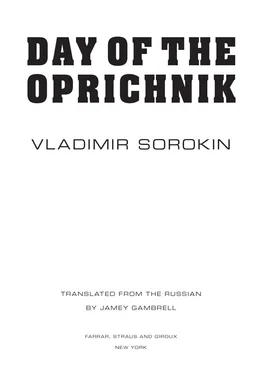Sorokin, Vladimir - Day of the Oprichnik
Здесь есть возможность читать онлайн «Sorokin, Vladimir - Day of the Oprichnik» весь текст электронной книги совершенно бесплатно (целиком полную версию без сокращений). В некоторых случаях можно слушать аудио, скачать через торрент в формате fb2 и присутствует краткое содержание. Год выпуска: 2011, Издательство: Farrar, Straus and Giroux, Жанр: Старинная литература, на английском языке. Описание произведения, (предисловие) а так же отзывы посетителей доступны на портале библиотеки ЛибКат.
- Название:Day of the Oprichnik
- Автор:
- Издательство:Farrar, Straus and Giroux
- Жанр:
- Год:2011
- ISBN:нет данных
- Рейтинг книги:5 / 5. Голосов: 1
-
Избранное:Добавить в избранное
- Отзывы:
-
Ваша оценка:
- 100
- 1
- 2
- 3
- 4
- 5
Day of the Oprichnik: краткое содержание, описание и аннотация
Предлагаем к чтению аннотацию, описание, краткое содержание или предисловие (зависит от того, что написал сам автор книги «Day of the Oprichnik»). Если вы не нашли необходимую информацию о книге — напишите в комментариях, мы постараемся отыскать её.
Day of the Oprichnik — читать онлайн бесплатно полную книгу (весь текст) целиком
Ниже представлен текст книги, разбитый по страницам. Система сохранения места последней прочитанной страницы, позволяет с удобством читать онлайн бесплатно книгу «Day of the Oprichnik», без необходимости каждый раз заново искать на чём Вы остановились. Поставьте закладку, и сможете в любой момент перейти на страницу, на которой закончили чтение.
Интервал:
Закладка:
I see Batya’s mobilov blink red. Indirect conversations are forbidden during the repast. We all turn off our mobilovs. A red signal means His Majesty is calling. Batya puts his solid gold mobilov to his ear, and it jingles against his bell earring.
“At your service, Your Majesty.”
Everyone in the refectory grows quiet. Batya’s voice is the only sound:
“Yes, Your Majesty. I understand. We’ll be there right away, Your Majesty.”
Batya stands up, looks us over quickly:
“Vogul, Komiaga, Tiaglo, with me.”
Ah. By Batya’s voice I can sense something has happened. We stand, cross ourselves, and leave the refectory. By Batya’s choice I understand— an affair of the mind awaits us. Everyone chosen has a university education. Vogul studied the workings of the treasury in St. Petrograd; Tiaglo specialized in book manufacturing in Nizhny Novgorod; and I joined the oprichnina from my third year at the history department of Moscow’s Mikhailo Lomonosov State University. Actually, I didn’t join…You don’t join the oprichnina. You don’t choose it. It chooses you. Or, more precisely, as Batya himself says when he’s had a bit to drink and snort: “The oprichnina pulls you in like a wave.” Oh, how it pulls you in! It pulls you in so fast that your head spins, the blood in your veins boils, you see red stars. But that wave can carry you out as well. It can carry you out in a minute, irrevocably . This is worse than death. Falling out of the oprichnina is like losing both your legs. For the rest of your life you won’t be able to walk, only to crawl…
We go out in the yard. From the White Chamber to His Majesty’s Red Palace is just a stone’s throw. But Batya turns toward our Mercedovs. So that means we’re not going to chat in the Kremlin. We all get into our cars. Batya’s Mercedov is distinguished—wide, bug-eyed, squat, with glass three fingers thick. It’s high quality work by Chinese masters, custom-made on special order, what they call te tzo dei . On the front hood is the head of a German shepherd, on the back a steel broom. Batya drives toward Savior Gates. We fall in line behind him and drive out through a cordon of Streltsy. We cross Red Square. Today is a market day; peddlers take up most of the square. The hawkers shout, saloop men whistle, bread sellers boom, the Chinese sing. The weather is sunny, nippy; there was a good snow during the night. The main square of our country is cheerful, musical. As a boy I witnessed an entirely different Red Square—grim, stern, frightening, with a big pile of granite housing the corpse of the Red Revolt’s maker. At that time a cemetery of his henchmen stood nearby. A gloomy picture. But His Majesty, our little father, tore down the granite box, buried the corpse of the squint-eyed rebel in the ground, and demolished the cemetery. Then he ordered the Kremlin walls to be painted white. And the main square of the country became genuinely krasny— red as in krasivo , beautiful. And thank God.
We drive toward the Hotel Moscow, along Mokhovaya Street, past the National Hotel, past the Bolshoi and Maly theaters, past the Metropol Hotel, and onto Lubianskaya Square. That’s what I thought: the conversation will take place in the Secret Department. We drive around the square past the monument to Malyuta Skuratov. Our forefather stands there in bronze, dusted with snow, short, stocky, stooping, with long arms; he gazes intently from under overhanging eyebrows. For centuries he has watched over Moscow with the Ever-Watchful Eye of the State; he watches us, the heirs of the oprichniks’ Great Work. He watches silently.
We drive up to the left gates; Batya honks. The gates open, and we enter the inner courtyard, park, and get out of our Mercedovs. We enter the Secret Department. Each time I walk under its gray marble arches, with their torches and stern crosses, my heart skips and then starts to beat differently. It’s an out-of-the-ordinary, special beat. The beat of the state’s Secret Work.
A dashing, fit lieutenant in a light blue uniform greets us and salutes. He accompanies us to the elevators, which carry us to the topmost floor, to the office of Terenty Bogdanovich Buturlin, the head of the Secret Department, a prince, and a close friend of His Majesty. We enter the office—first Batya, then the rest of us. Buturlin greets us. He and Batya shake hands; we bow to our waists. Buturlin’s expression is serious. He shows Batya to a chair, and sits down across from him. We stand behind Batya. The head of the Secret Department has a menacing face. Terenty Bogdanovich is no joker. He loves to monitor important, complex, critical state affairs, to uncover and undermine conspiracies, catch traitors and spies, smash subversive plots. He sits silently, looking at us, fingering his carved bone beads. Then he says one word:
“Pasquinade.”
Batya waits. We freeze and don’t even breathe. Buturlin looks at us searchingly, and adds:
“On His Majesty’s family.”
Batya turns in the leather armchair, frowns, and cracks his large knuckles. We stand absolutely still. Buturlin gives a command, and the blinds on the office windows are lowered. A kind of twilight fills the room. The head of the Secret Department gives another command. Words are pulled up from the Russian Network; they hang in the dim light. The letters are iridescent, burning in the dark:
by Well-Meaning Anonymous
WEREWOLF AT A FIRE
Firemen are looking,
The police are looking,
Even priests are looking
Through our capital city.
They’re seeking a Count,
Whom they haven’t yet found,
Nor ever have seen,
A Count round about age thirty-three.
Of medium height,
Pensive and glum,
He’s smartly attired,
In tails and cummerbund.
Cut in the signet ring
On his finger,
A hedgehog of diamond gleams and glims,
But not a whit more is known about him.
Nowadays,
Counts are oft
Pensive and glum,
Stylishly garbed,
In tails and cummerbund.
They adore the alluring
Dazzle of diamonds,
The dolce vita
Is just waiting to find them.
Who is he?
Whencesoever?
What manner of beast
The count whom they seek
In our
Capital city?
What hath he done,
This chic aristocrat?
Here’s what Moscow’s salons
Say to that!
Once, a Rolls-Royce
Wound its way,
All round Moscow.
A Count most forlorn,
Who resembled an owl,
Rode in it alone.
Sullenly squinting, morosely he yawned,
While humming an air
from a Wagner song.
All of a sudden,
In a glass ’cross the lane,
The Count
Spied a Marquess,
Encircled by flame.
A swarm of idlers,
Crowded the pavement,
The ancestral mansion
Was fully ablaze.
Gloating, the loafers
Ogled fire and pitch,
After all, such abodes
Were just for the rich.
Out of the cozy Rolls-Royce
The Count raced.
Ne’er a moment he wasted,
He cut through the rabble,
Of miserable swine,
Making very good time,
Then up, up, up,
Up the drainpipe
He climbed.
The third floor,
The fourth,
The fifth…
Then the last one,
Engulfed by the fire.
Out came piteous cries,
Then moans growing fainter—
Flames were now licking
The balcony sides.
Pale and quite naked,
Framed by the window,
The Marquess fluttered
In fantastical plumes;
Then a flare of the fire,
’Midst the dove-colored fumes,
Did illumine her milky white breast
On the pyre.
His hands strong and lithe,
The Count drew himself up,
Then with all of his might,
Читать дальшеИнтервал:
Закладка:
Похожие книги на «Day of the Oprichnik»
Представляем Вашему вниманию похожие книги на «Day of the Oprichnik» списком для выбора. Мы отобрали схожую по названию и смыслу литературу в надежде предоставить читателям больше вариантов отыскать новые, интересные, ещё непрочитанные произведения.
Обсуждение, отзывы о книге «Day of the Oprichnik» и просто собственные мнения читателей. Оставьте ваши комментарии, напишите, что Вы думаете о произведении, его смысле или главных героях. Укажите что конкретно понравилось, а что нет, и почему Вы так считаете.












